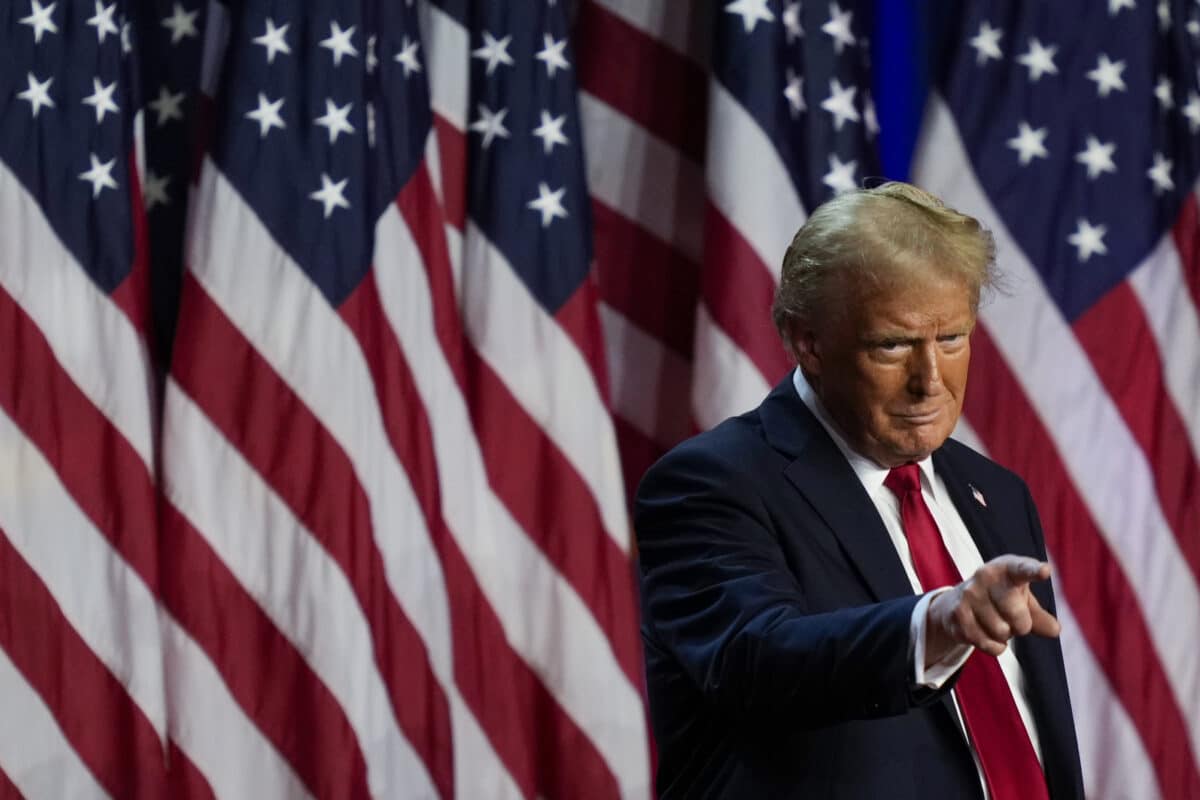
President-elect Donald Trump points to the crowd at an election night watch party of the Republican, Wednesday, Nov. 6, 2024, in West Palm Beach, Fla. —AP Photo/Julia Demaree Nikhinson
LOS ANGELES, California — Over chilled glasses of their favorite Jollibee halo-halo and lukewarm taho, they came to drown their sorrows.
Three days after the US presidential election, these Filipino immigrants gathered on Friday afternoon at Eagle Rock Mall just northeast of this city to express dread at the object of their newfound fear: Donald Trump.
Inside this mall where a cluster of Filipino-brand businesses dot the landscape, these immigrants—now naturalized American citizens—discussed how a resurgent Trump will impact their lives in America.
READ: How Trump’s mass deportation plan will impact undocumented Filipinos
Trump’s improbable comeback to become the 47th president of the United States last Tuesday came as a shock to these Filipino-Americans who passionately supported Vice President Kamala Harris, regarding her as California’s own for serving as their senator and attorney general in the past.
“Sobrang bastos pero marami pa rin ang bomoto sa kanya (He [Trump] is so vulgar and offensive yet so many voted for him),” said Ramon Geronimo, a security guard at this mall here. He migrated to the United States in 2016 after retiring from the Department of the Interior and Local Government in Manila.
“Kakainis, talo manok namin (It’s so disappointing that our bet lost),” caregiver Magdalena Palomares, 73, said, referring to Harris, the Democratic candidate who lost the popular vote by almost 4 million and garnered only 226 votes in the Electoral College against Trump’s 301 votes.
“Our friends voted for Trump. That is what we do not understand,” said Rebecca de Jesus, also a caregiver whose family originally came from Divisoria in Manila.
Fil-Ams in California politics
Suddenly, their palpable sadness was quickly tempered by a flash of good news as two giant TV screens inside the mall announced with finality two historic firsts: Ysabel Jurado, a 34-year-old openly gay lawyer and single mother, will become the first Filipino-American to be elected to the Los Angeles city council.
Jessica Caloza, a protégé of former President Barack Obama and attorney general Rob Bonta, also blazed her way to political empowerment by becoming the first Filipino-American (Fil-Am) born in the Philippines to be elected to the California state legislature representing the 52nd district.
“We are so happy for Jessica and Ysabel,” said Palomares, who arrived in California in 2015 after retiring as a public school teacher in Calumpit, Bulacan.
“At least may kakampi na tayo (At least we have some people on our side),” said De Jesus, 67, referring to the double wins of Jurado and Caloza—both first-time politicians who are members of the growing progressive wing of the Democratic Party in Los Angeles, the second-biggest city in the United States.
Jurado and Caloza are expected to fortify the ramparts of the resistance being planned by California Gov. Gavin Newsom and Attorney General Rob Bonta against the authoritarian assault being planned by Trump on democratic rights in America.
‘Terrorists, animals’
But Geronimo, De Jesus and Palomares are the outliers. They differ from the majority of Filipino-Americans who—according to exit polls last week—voted overwhelmingly for Trump, who had described Filipinos in 2015 as “terrorists” and “animals.”
But Trump’s name-calling is secondary to their fears that he will take away their health-care insurance under Obamacare and rebuff their dreams of reuniting with their families with his anti-immigration stance.
“If Trump takes away my health insurance, that will be the end of me,” said Rowena Mendoza, a retiree who asked this reporter that her medical condition be kept private.
“I live alone and my mother, Aurea, died last year,” the 60-year-old Mendoza added.
De Jesus said “I am waiting for my two twins to join me in America.” She was referring to her 31-year-old twin daughters Stephanie and Elena, who are awaiting the outcome of their petition in Manila.
Preparing to board her bus for a 12-hour shift as a caregiver in the Los Angeles neighborhood of Reseda about 35 kilometers away, De Jesus fears that she may not realize her dream of family reunification if Trump tightens the screws on immigration.
Uncertainty, hope
“I’m afraid that this may happen under Trump,” she said.
In an ethnic enclave where majority of Filipinos do not own a home, Caloza and Jurado, whose districts, including Eagle Rock overlap each other, fought hard for renters’ rights during their respective campaigns.
“They really fought for us. We hope our rents will come down,” said Geronimo, who pays $2,000 a month for a two-bedroom apartment here in Eagle Rock.
On the day Trump won, these four Filipino immigrants were suddenly forced to face an uncertain future.
But the historic victories of Caloza and Jurado somehow give them a glimmer of hope.

